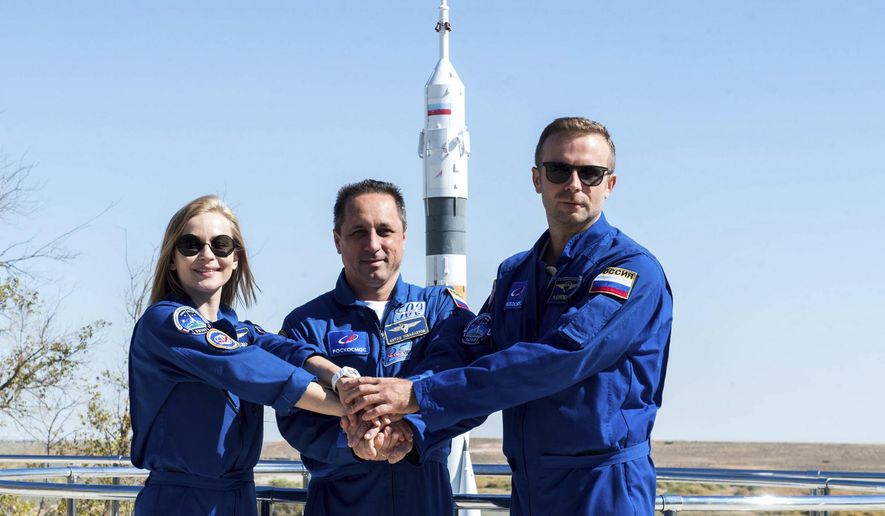MOSCOW (AP) — A Russian actor and a film director rocketed to space Tuesday on a mission to make the world’s first movie in orbit, a project the Kremlin said will help burnish the nation’s space glory.
Actor Yulia Peresild and director Klim Shipenko blasted off for the International Space Station in a Russian Soyuz spacecraft together with cosmonaut Anton Shkaplerov, a veteran of three space missions. Their Soyuz MS-19 lifted off as scheduled at 1:55 p.m. (0855 GMT) from the Russian space launch facility in Baikonur, Kazakhstan and arrived at the station after about 3½ hours.
Shkaplerov took manual controls to smoothly dock the spacecraft at the space outpost after a glitch in an automatic docking system.
The trio reported they were feeling fine and spacecraft systems were functioning normally.
Peresild and Klimenko are to film segments of a new movie titled “Challenge,” in which a surgeon played by Peresild rushes to the space station to save a crew member who suffers a heart condition. After 12 days on the space outpost, they are set to return to Earth with another Russian cosmonaut.
Kremlin spokesman Dmitry Peskov said the mission will help showcase Russia’s space prowess.
“We have been pioneers in space and maintained a confident position,” Peskov said. “Such missions that help advertise our achievements and space exploration in general are great for the country.”
Speaking at a pre-flight news conference Monday, 37-year-old Peresild acknowledged that it was challenging for her to adapt to the strict discipline and rigorous demands during the training.
“It was psychologically, physically and morally hard,” she said. “But I think that once we achieve the goal, all that will seem not so difficult and we will remember it with a smile.”
Shipenko, 38, who has made several commercially successful movies, also described their fast-track, four-month preparation for the flight as tough.
“Of course, we couldn’t make many things at the first try, and sometimes even at a third attempt, but it’s normal,” he said.
Shipenko, who will complete the shooting on Earth after filming the movie’s space episodes, said Shkaplerov and two other Russian cosmonauts now on board the station — Oleg Novitskiy and Pyotr Dubrov - will all play parts in the new movie.
Russia’s state-controlled Channel One television, which is involved in making the movie, has extensively covered the crew training and the launch.
“I’m in shock. I still can’t imagine that my mom is out there,” Peresild’s daughter, Anna, said in televised remarks minutes after the launch.
Dmitry Rogozin, head of the Russian state space corporation Roscosmos, was a key force behind the project, describing it as a chance to burnish the nation’s space glory and rejecting criticism from some Russian media.
Some commentators argued that the film project would distract the Russian crew and could be awkward to film on the Russian segment of the International Space Station, which is considerably less spacious compared to the U.S. segment. A new Russia lab module, the Nauka, was added in July, but it is yet to be fully integrated into the station.
On the space station, the three newcomers join the station’s commander Thomas Pesquet of the European Space Agency; NASA astronauts Mark Vande Hei, Shane Kimbrough and Megan McArthur; Roscosmos cosmonauts Novitskiy and Dubrov; and Aki Hoshide of the Japan Aerospace Exploration Agency.
Novitskiy, who will star as the ailing cosmonaut in the film, will take the captain’s seat in a Soyuz capsule to take the film crew back to Earth on Oct. 17.
Before Russia took the lead in feature filmmaking in space, NASA had talked to actor Tom Cruise about making a movie in orbit.
NASA confirmed last year that it was in talks with Cruise about filming on the International Space Station with SpaceX providing the lift.
Last month, representatives for SpaceX’s first privately chartered flight said the actor took part in a call with the four space tourists who orbited more than 585 kilometers (360 miles) high.




Please read our comment policy before commenting.